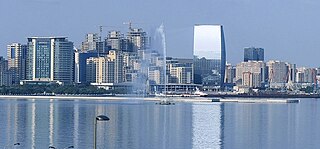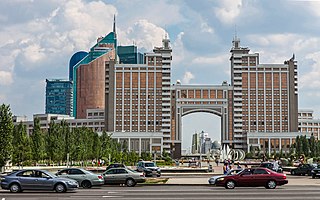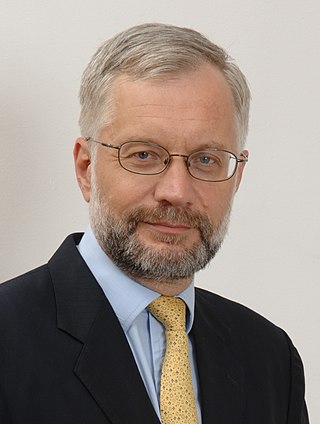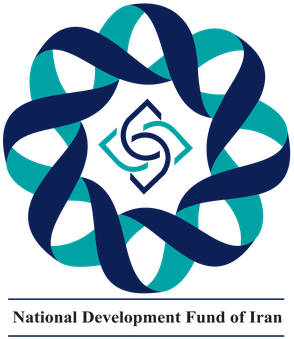
The economy of Azerbaijan has completed its post-Soviet transition into a major oil-based economy, from one where the state played the major role. The transition to oil production led to remarkable growth figures as projects came online; reaching 26.4% in 2005 and 34.6% in 2006 before subsiding to 10.8% and 9.3% in 2008 and 2009 respectively. The real GDP growth rate for 2011 was expected at 3.7% but had dropped to 0.1%. Large oil reserves are a major contributor to Azerbaijan's economy. The national currency, the Azerbaijani manat, was stable in 2000, depreciating 3.8% against the dollar. The budget deficit equaled 1.3% of GDP in 2000.

Kazakhstan, officially the Republic of Kazakhstan, is a landlocked country located mainly in Central Asia and partly in Eastern Europe. It borders Russia to the north and west, China to the east, Kyrgyzstan to the southeast, Uzbekistan to the south, and Turkmenistan to the southwest, with a coastline along the Caspian Sea. Its capital is Astana, known as Nur-Sultan from 2019 to 2022. Almaty, Kazakhstan's largest city, was the country's capital until 1997. Kazakhstan is the world's ninth-largest country by land area and the largest landlocked country in the world. It has a population of 19 million people and one of the lowest population densities in the world, at fewer than 6 people per square kilometre. Ethnic Kazakhs constitute a majority of the population, while ethnic Russians form a significant minority. Officially secular, Kazakhstan is a Muslim-majority country, although ethnic Russians in the country form a sizeable Christian community.

The economy of Kazakhstan is the largest in Central Asia in both absolute and per capita terms. In 2021, Kazakhstan attracted more than US$370 billion of foreign investments since becoming an independent republic after the collapse of the former Soviet Union.

The politics of Iran takes place in the framework of an Islamic theocracy which was formed following the overthrow of Iran's millennia-long monarchy by the 1979 Iranian Islamic Revolution.

The PJSC LukoilOil Company is a Russian multinational energy corporation headquartered in Moscow, specializing in the business of extraction, production, transport, and sale of petroleum, natural gas, petroleum products, and electricity. It was formed in 1991 when three state-run, western Siberian companies named after the respective town in Khanty–Mansi Autonomous Okrug that each was based in, Langepasneftegaz, Urayneftegaz, and Kogalymneftegaz, merged. Its name is the combination of the acronym LUK and the English word "oil".

The Extractive Industries Transparency Initiative (EITI) is a global standard for the good governance of oil, gas and mineral resources. It seeks to address the key governance issues in the extractive sectors.

NNPC Limited is a for profit oil company in Nigeria. Formerly a government-owned corporation, it was transformed from a corporation to a limited liability company in July 2022. NNPC Limited is the only entity licensed to operate in the country's petroleum industry. It partners with foreign oil companies to exploit Nigeria's fossil fuel resources.

KazMunayGas (KMG) (Kazakh: QazMūnaiGaz, ҚазМұнайГаз) is the state-owned oil and gas company of Kazakhstan. It was founded in 2002 by merging CJSC Kazakhoil and CJSC Oil&Gas Transportation.

The Ministry of Petroleum (MOP) (Persian: وزارت نفت, romanized: Vezârat-e Naft) manages the oil industry, the producer of oil and petrochemical products. MoP is in charge of all issues pertaining to exploration, extraction, exploitation, distribution and exportation of crude oil and oil products. In addition, according to the "Imports and Exports Regulation Act", issuing import licenses for such products is also among the functions of the Ministry of Petroleum. The ministry has been placed under sanctions by the United States Department of State as of 2020.

Grigory Alexandrovich Marchenko is a Kazakh financier, banker and politician.
Energy in Kazakhstan describes energy and electricity production, consumption and import in Kazakhstan and the politics of Kazakhstan related to energy.

The Order of Kurmet or the Order of Honour is an order awarded by the government of Kazakhstan since 1993. It is awarded to citizens of Kazakhstan who have exhibited merit in the fields of economics, science, culture, social issues, and education. The order has no grades or classes.

Samruk-Kazyna, officially known as the National Welfare Fund "Samruk-Kazyna", is a sovereign wealth fund and joint stock company in Kazakhstan which owns, either in whole or in part, a number of major companies in the country. This includes the national rail and postal service, the state oil and gas company KazMunayGas, the state uranium company Kazatomprom, Air Astana, and others. The state is the sole shareholder of the fund.
Kazakh-British Technical University, or KBTU is a research and educational institution located in Almaty, Kazakhstan. It was founded in 2001.

The National Development Fund of Iran is Iran's sovereign wealth fund. It was founded in 2011 to supplement the Oil Stabilization Fund. NDFI is independent of the government's budget. Based on Article 84 of the Fifth Five-year Socio-Economic Development Plan (2010–2015), the National Development Fund was established to transform oil and gas revenues to productive investment for future generation. It is a member of the International Forum of Sovereign Wealth Funds and therefore is signed up to the Santiago Principles on best practice in managing sovereign wealth funds. Withdrawing any money from this fund requires Khamenei's permission.

Sauat Mukhametbayuly Mynbayev is a Kazakh politician who served as the minister of oil and gas of Kazakhstan from 2010 to 2013. Until 2021 he was also the CEO of Kazakhstan Temir zholy.
Science and technology in Kazakhstan – government policies to develop science, technology and innovation in Kazakhstan.

The Ministry of Internal Affairs is the Kazakh government ministry which oversees the police and the National Guard of Kazakhstan. The Ministry is headed by the Minister of Internal Affairs of the Republic of Kazakhstan, appointed by the decree of the President of Kazakhstan. The Minister of Internal Affairs has 5 deputies, including the First Deputy Minister.

Magzum Maratuly Myrzagaliev is a Kazakh politician who has served as Minister of Energy (2021-2022). Prior to that, he was the Minister of Ecology, Geology and Natural Resources from 2019 and in the ministry as Vice after working in engineering and managing national company businesses. April 14, 2022 - he was appointed as a Chairman of the Board of JSC NC KazMunayGas.















